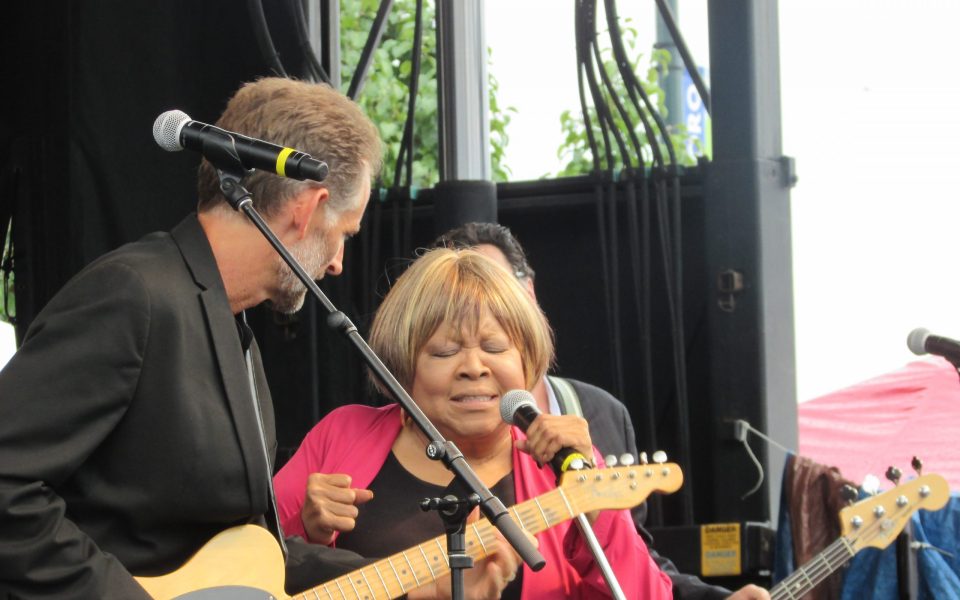by Jordan Green
The inaugural run of the National Folk Festival’s three-year residency in downtown Greensboro over this past weekend displayed a dazzling mosaic of regional music from across the United States.
Reinforcing longstanding mainstays like bluegrass, Cajun and the blues, tributaries from immigrant traditions like West African highlife music and klezmer also made the National Folk Festival a showcase for international music.
The festival exploded the stereotype of folk music as strictly protest songs or sensitive singer-songwriter fare, instead presenting a crazy quilt of regional traditions that represent a consensus about what various cultures consider worth preserving. Between the close bluegrass harmonies of the Buckstankle Boys from Mount Airy and the infectious go-go music of Washington DC’s Trouble Funk, you could likely find a place that culturally felt like home, whatever your background.
With multiple stages distributed across a transformed urban landscape of closed streets, parks and repurposed parking lots, the festival presented an impossible array of enticing choices. In that sense, it was difficult to pin down. Even if you found time to attend about 80 percent of the festival, which ran from 5:45 p.m. on Friday through 6:30 p.m. on Sunday, you could still come away harboring serious regrets about missing stellar acts like the Dardanelles, Lutchinha, the Pine Leaf Boys and the aforementioned Trouble Funk.
The festival’s inclusive spirit meant that members of ethnic communities with a relatively small presence in North Carolina’s Piedmont could find cultural validation from visiting performers, while wider audiences were exposed to fantastic music they might never have heard before. The audience for Grand Master Seiichi Tanaka & the San Francisco Taiko Dojo’s Japanese drumming skewed more Asian than most of the sets, but the sense of awe at the sheer intensity and physical discipline displayed by the young percussionists was shared across lines of race and nationality. Likewise, a beaming young father wore a Belizean flag on his shoulder for guitarist Aurelio Martinez and his band’s buoyant outpouring of syncopated dance music. Considered a musical ambassador of the Garifuna, an African-Amerindian ethnic group based on the Caribbean coast of Central America, Martinez proved to be a gracious host. It wasn’t long before a diverse audience was dancing, and joining the music with rhythmic handclaps and humming.
If one artist could possibly embody the spirit of the festival as an expression of Greensboro’s particular place in America, it would undoubtedly be Mavis Staples, who filled the parking lot across from the News & Record building for her sole performance at 4 p.m. on Saturday afternoon.
With her able band providing a restrained funk backing, the ebullient Staples energized and uplifted her diverse audience with Staple Singers material, ranging from civil rights anthems of the ’60s to positive soul from the early ’70s, continuing through to majestic representations of her recent solo work.
The subtext of “Freedom Highway,” a song originally released in the same year that the Voting Rights Act was passed, being performed in the city that had given birth to the sit-in movement didn’t need to be explained. Building from the original song’s searing north Mississippi hill country stomp, Staples vamped, “I won’t turn around,” giving the song an immediacy in the current historical moment.
By the time she got to the Staple Singers’ early ’70s anthem, “I’ll Take You There,” the audience was in the palm of her hand. When Staples sang, “I know a place/ ain’t nobody crying,” the crowd chanted back, “Ain’t nobody worried.”
Aside from Staples, the artist who came closest to embodying the festival was Rhiannon Giddens, a Guilford County native whose burgeoning solo career has built from national renown as a member of the Carolina Chocolate Drops. She reunited with Justin Robinson, a former Chocolate Drops member, for a set to honor their late mentor Joe Thompson, an African-American fiddler from Mebane. The capacity crowd at the Lawn Stage early Saturday afternoon attested to the respect and love the local audience holds for Giddens.
Her fans’ devotion was proven again by the rapt attention paid by the audience to the Sunday Gospel & Traditional Music showcase co-hosted by Giddens the next day. It would be hard for most artists to match power of the Welch Family Singers’ Cherokee-language rendition of “I Am a Poor Wayfaring Stranger” in honor of the victims of the Trail of Tears.
But the clarity of Giddens voice, an instrument of uncommon precision that reaches deep into an emotional core, caused the audience to fall silent as she sang “His Eye Is on the Sparrow” without instrumental accompaniment.
“Yes, Rhiannon,” a woman murmured from the crowd. “Beautiful.”
Join the First Amendment Society, a membership that goes directly to funding TCB‘s newsroom.
We believe that reporting can save the world.
The TCB First Amendment Society recognizes the vital role of a free, unfettered press with a bundling of local experiences designed to build community, and unique engagements with our newsroom that will help you understand, and shape, local journalism’s critical role in uplifting the people in our cities.
All revenue goes directly into the newsroom as reporters’ salaries and freelance commissions.


Leave a Reply